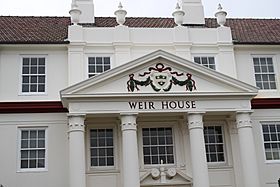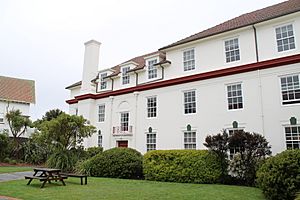Weir House (Victoria University of Wellington) facts for kids
Quick facts for kids Weir House |
|
|---|---|
| He Toa Takitini | |

Main entrance of Weir House
|
|
 |
|
| University | Victoria University of Wellington |
| Location | Gladstone Terrace, Wellington |
| Coordinates | 41°17′02″S 174°46′13″E / 41.283757°S 174.770358°E |
| Motto | Ex contubernio robur (Latin) |
| Motto in English | Strength through companionship |
| Established | 1933 |
| Head | Dean Banks |
| Undergraduates | ~300 |
Weir House is a special home for students who go to Victoria University of Wellington. It is located in the city of Wellington, which is in New Zealand. Weir House is a place where over 300 university students live while they study. It is the second oldest student residence at the university, built a long time ago.
History of Weir House
How Weir House Began
In 1926, a man named William Weir passed away. He left a large sum of money, about £77,500, to the university. He wanted this money to build a place for male students to live.
Work on Weir House started in 1930. However, a big earthquake hit Napier in February 1931. Because of this, the building plans had to be changed. The new design made sure the building would be safer.
On March 1, 1933, the governor-general officially opened Weir House. The governor-general is a special person who represents the King or Queen in New Zealand. He even planted a pohutukawa tree to mark the opening! That year, 65 students moved into the first part of Weir House, called the William Weir wing. By 1935, so many students wanted to live there that there was a waiting list.
Growing and Changing
In 1968, a new part of Weir House was built. It was called the James Hutchison Wing. This new wing was funded by the Department of External Affairs. It was part of a plan called the Colombo Plan, which helped countries work together. This wing was updated and made bigger in 1994.
At first, only male students could live at Weir House. This was because of William Weir's original wishes. But in 1979, female students were finally allowed to live there too. This happened because the new parts of the hall were built with government money.
New Additions
In 1987, the university bought the old home of the Japanese ambassador. This building was turned into Andrea Brander House. Students who prefer to live in an alcohol-free area can choose to live here.
In 2006, another new building was added. It is also an alcohol-free area and is called Te Whānau. This building has a special glass lounge named Piringa. This lounge is a common area where students can relax and spend time together.
 | DeHart Hubbard |
 | Wilma Rudolph |
 | Jesse Owens |
 | Jackie Joyner-Kersee |
 | Major Taylor |


